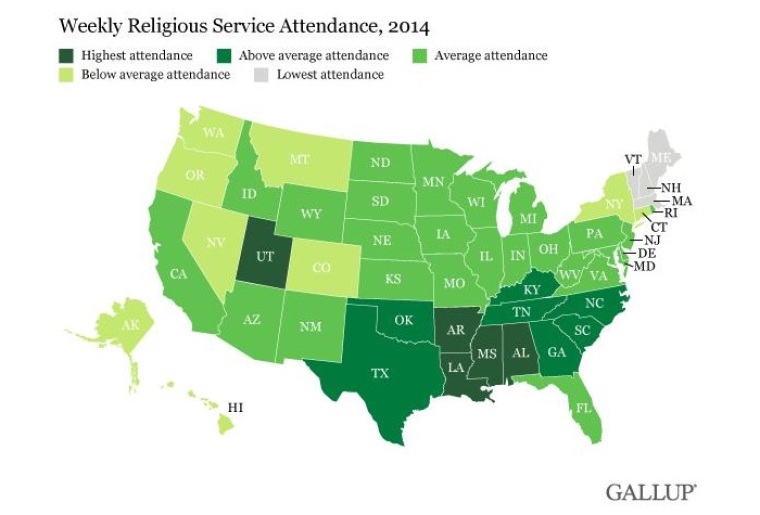Southerners lead nation in church attendance

PRINCETON, N.J. (Christian Examiner) – If you live in the South, odds are good that you will attend church each week.
The recent release of a year-long study by Gallup showed state-by-state results of a look at the number of people involved in a weekly religious service. Eleven of the top 12 states for attendance at a religious service were in the South and Southwest.
Mississippi topped the list of southern states, with 47 percent of its population in a weekly religious service, followed by Alabama and Louisiana with 46 percent each. Arkansas came in at 45 percent; South Carolina and Tennessee both had 42 percent of their populations in weekly religious services. Kentucky scored 41 percent; North Carolina, 40 percent; Georgia, Texas and Oklahoma each saw 39 percent of their residents in church on Sunday.
Utah, with 59 percent of the state identifying with the Mormon faith, took first place with 51 percent of the population in church on Sunday.
While the South dominated the high attendance list, states with low church-going behavior were found in the Northeast.
Vermont was at the bottom of the list with only 17 percent of residents claiming to attend religious services every week.
New Hampshire and Maine, both with 20 percent, and Massachusetts with 22 percent, were close to Vermont's lack of church going.
States in the northwestern United States were next with Washington and Oregon having 24 percent of their residents in church Sunday morning.
Hawaii, Colorado and Connecticut each scored 25 percent. Alaska came in at 26 percent, filling out the bottom 10 states for weekly worship services.
These results are based on 177,030 Gallup Daily tracking interviews throughout 2014 with U.S. adults, according to a Gallup press release, and reflect those who say "at least once a week" when asked, "How often do you attend church, synagogue or mosque -- at least once a week, almost every week, about once a month, seldom or never?"
"Church attendance self-reports are estimates, and may not reflect precise week in and week out attendance, but provide an important measure of the way in which Americans view their personal, underlying religiosity," the Gallup report noted. "In particular, the focus on the top category of 'weekly' attendance yields a good indicator of the percentage of each state's population that is highly religious, and for whom religion is likely to be a significant factor in their daily lives."
The state-by-state variations in church attendance are significant because attendance is a powerful indicator of underlying religiosity, which in turn is related to Americans' views on life, culture, society in general and politics, according to the press release.
"For most segments of U.S. society -- blacks being the exception -- those who are the most religious are also most likely to be Republican, which helps explain the significant relationship between states with the highest church attendance and those that are traditionally red states. Church attendance also provides ties that bind members to their communities, and research shows that at the individual level, those who are most religious have higher well-being than those who are less religious."